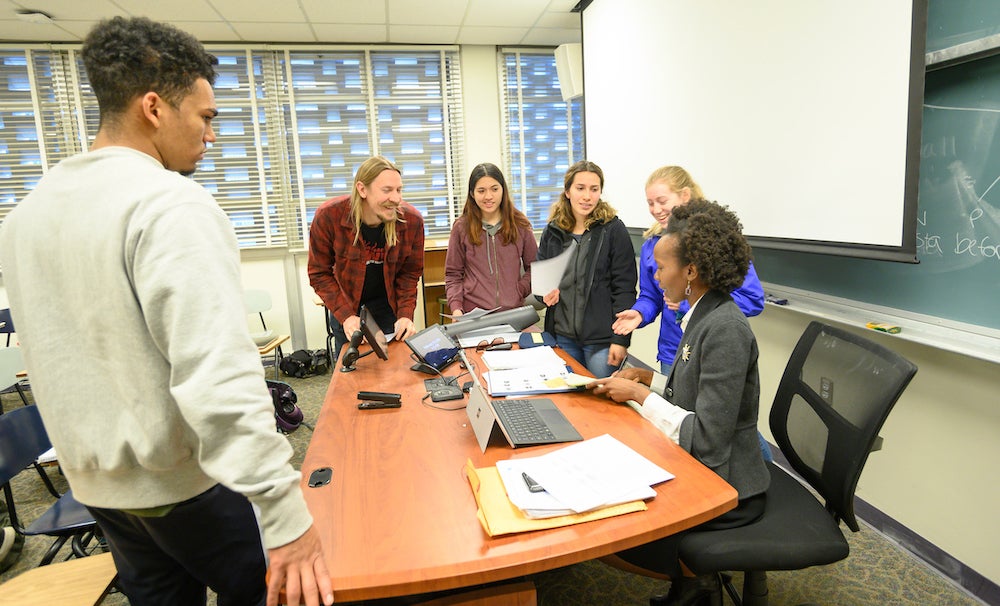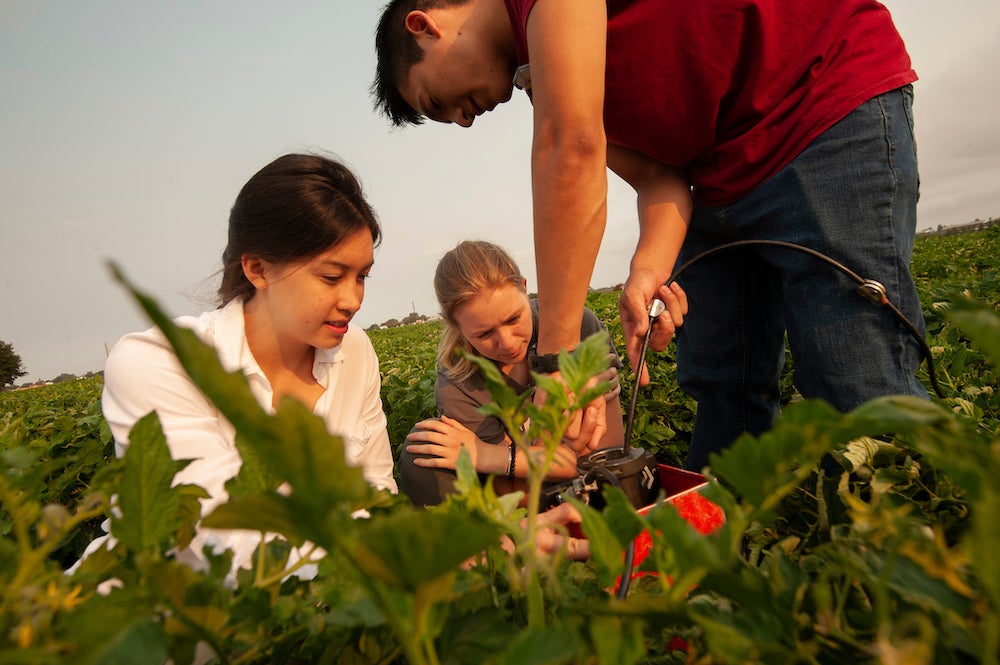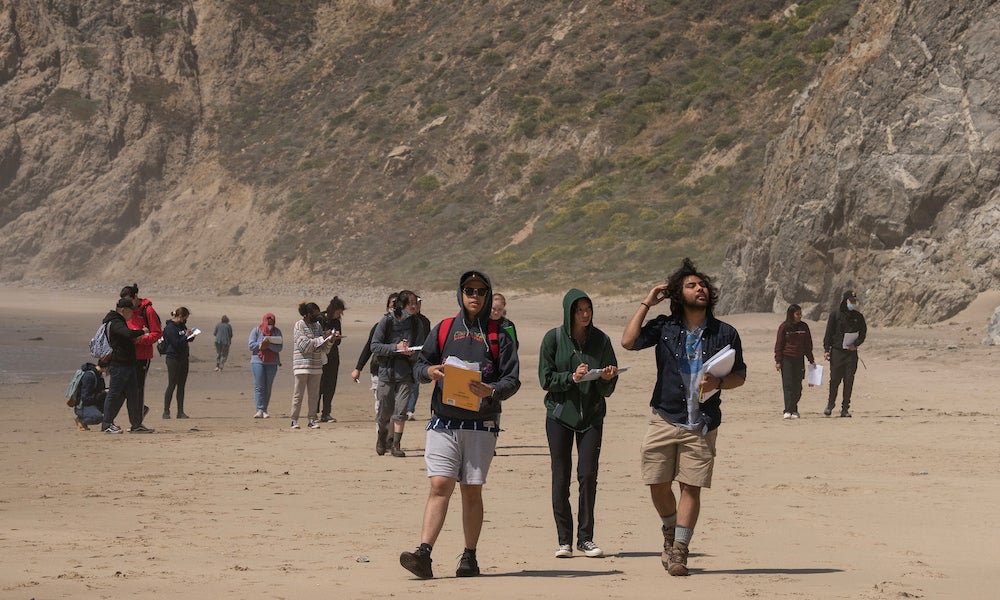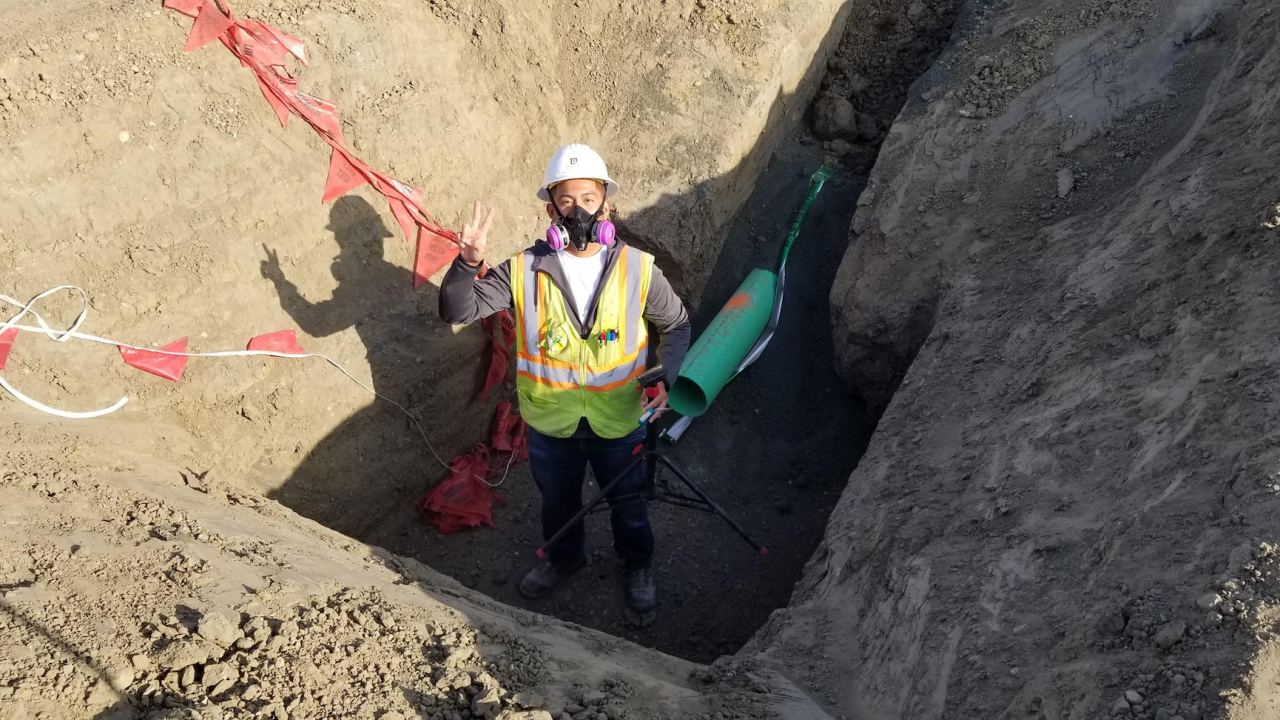Carissa Abraham and Bill Peralta, UC Davis 2020 graduates, have been friends since day one of their time at UC Davis. “We took at least one class together every quarter from then on,” Carissa laughed. They worked on countless projects for their environmental engineering major. They both fell in love with the major — a collaborative study that requires problem-solving for the toughest issues to ensure everyone lives in a safe environment.
Environmental engineering is a major for students with a wide range of interests who are ready to solve the world's toughest challenges. “We don’t fix problems, we find solutions,” Bill reflected.
As a discipline that focuses on sustainability, the environmental engineering major is growing in popularity. With a wide range of courses to choose from and lots of hand-on experience nearby, the major prepares undergraduates to jump straight into a career after graduating. Many students, including Carissa and Bill, chose to double major in civil and environmental engineering, as the two studies work in tandem. Consequently, students learn in a wide range of settings moving from the lab, to the classroom, and even to the mud, collecting samples on site.
“Engineers you might think are white collar, clean hands, [and] calculator in hand,” Bill said. “But in environmental engineering…you get your hands dirty.”
Heather Bischel, an associate professor in the Civil and Environmental Engineering Department, enjoyed math and science as an undergraduate, but knew she wanted to help protect the environment. “I found environmental engineering as this kind of sweet spot of helping to address problems in quantitative ways,” said Professor Bischel. Environmental engineers work on problems around water quality, contamination, and environmental health, ensuring safe water, clean air and healthy ecosystems.
How do I find a support network as an environmental engineering major?

As a new program in the department, environmental engineering majors can find a strong support system. A growing number of on-campus organizations and clubs have developed to foster this new community.
“Engineers without borders is one example where students work on international projects related to water sanitation and health,” Professor Bischel said. The club offers on-site visit opportunities and the learning can continue post-graduation with professional chapters. “There’s also an environmental competitions team that works on waste water and water treatment challenges,” she added. The opportunities continue with organizations like the American Society for Civil Engineers (ASCE) and the American Water Works Association (AWWA) that help students connect to professionals within the field.
The environmental engineering major asks students to collaborate, and the coursework and group projects form friendships and teams. “I think that there's a nice connection amongst students in the program through the student organizations and all the coursework and challenges they face together,” Professor Bischel said.
Bill also described the major as tight knit.
“It felt like everybody took the same classes at the same time. Every quarter I would see the same faces, which I really enjoyed” he said.
As a new major, it also means the upper division courses are small and students can easily chat with their professors and TAs. The major culminates in a senior year project that lasts two quarters. These projects force students to work together and use their knowledge for real world applications. “The projects…bring in real world challenges and it's not always cut and dry what the answer is,” Professor Bischel said. So their exploration “requires that kind of collaboration.”
These projects also provide a great opportunity to get to know classmates. “By my senior year I knew everyone in most classes pretty well. I think people were really friendly [and] very much willing to help you,” said Carissa. Study groups and group projects let students bond, so much so, Carissa was headed to San Luis Obispo with several friends from the major the weekend after our interview!
The environmental engineering major offers a wide range of courses

The environmental engineering major covers a wide range of coursework that asks students to tackle problems and projects. The major spans a range of subjects, including:
- Chemistry
- Biology
- Physics
- Mathematics
- Climate change
- Social sciences
These subjects provide the fundamentals of environmental engineering. Bill said a project in ECI 40 "Introduction to Environmental Engineering" stood out to him. The class had a mock debate about the use of California's water. “That whole debate exercise, I find I do pretty much every day,” said Bill.
Carissa said the projects taught her to work strategically with others of different perspectives and backgrounds. The courses vary in format, such as laboratory work, modeling, policy, or quantitative work. This diverse combination helps undergraduates design solutions to environmental challenges.
These subjects are then used to work on applied problems around pollution, contamination, exposure to pathogens, and wastewater treatment. “Students have to be thinking about real world applications early on,” Professor Bischel said. “You need to know the fundamental science and to do problems correctly, but also you need to be thinking outwardly.”
Carissa knew she wanted to focus on water, so the environmental engineering major let her work on water problems not only specific to California, but the world. This diverse perspective on engineering ideas allowed Carissa to understand her major's application.
“I think what was cool about Davis is there were professors from all over,” Carissa said. “I had one professor who worked specifically in Kenya, so we got to talk about how engineering concepts were applied in other countries.”
Bill said the environmental engineering major taught him key skills, including critical thinking, looking at a picture holistically, and thinking outside the box. Bill highlighted “Introduction to Environmental Engineering” with Colleen Broder as key in building his own engineering soft skills. “A lot of different stakeholders might have different interests and goals for a certain development and, as an environmental engineer, it's our job to take all of those into account when we’re designing any sort of mitigation to prevent health issues,” Bill said.
In the course, Bill learned the importance of understanding your audience and considering the perspective of multiple stakeholders. “Make sure you know exactly what you’re trying to communicate [and] what you're trying to get out of your audience, so you can formulate your message effectively,” he said.
An environmental engineering major can lead to many careers

The environmental engineering major requirements are all designed to prepare students to enter into the profession, Professor Bischel said.
At a UC Davis career fair, Bill found his current position as an environmental engineer for Cornerstone Earth Group, a geotechnical and environmental consulting firm in Sunnyvale, California. Bill has now been at Cornerstone for two years addressing environmental concerns in many ways. He looks at site history, performs sampling at sites, and prepares site management plans. “Think of it like a cradle-to-grave investigation on any issues that might be on a particular site,” Bill said.
The major can also prepare you for further education.
“Graduating from UC Davis prepares you to go to the very top schools,” Professor Bischel said. “There's just a gamut, because it's such a field with diverse applications and a lot of need, so it's present in a lot of locations.”
After UC Davis, Carissa jumped into her masters in environmental engineering with a concentration in fluid mechanics and hydrology at UC Berkeley, wanting to have the options to teach and dive deeper into water concepts. She graduated in 2021 and began as an assistant engineer with MBK Engineers, a consulting company based in Sacramento that works in reservoir operations. Her current supervisor reached out to her via LinkedIn. “It actually ended up being exactly what I wanted to do,” she smiled.
Though she was happy with her final role, Carissa confessed to almost giving into pressure and accepting positions she was not passionate about. “Don’t let the stress make you immediately take a job you don't actually want,” recommended Carissa. She admitted the job hunt was overwhelming: finding a place to live and searching for a position, while being a full-time student is difficult. She recommended students take their time and chat with their peers. “So, talk to other people, get other ideas, other perspectives,” reflected Carissa.
The variety of courses offered by the environmental engineering major let students step into many roles. Students can pursue a career in environmental science or focus on policy relating to civil and environmental infrastructure.
Is environmental engineering a good degree for me?

To find out whether environmental engineering is the right major for you, Professor Bischel emphasized networking. “I think going out and meeting some environmental engineers is really a great way to do that,” Professor Bischel said. “Setting up informational interviews with professionals.” Chatting with environmental engineering consulting companies or public agencies could give students an understanding of day-to-day work.
“Are people engaging in challenges that you’re also interested in addressing? And what are your core motivations? Do they align with what you see in those scenarios?” Professor Bischel said.
Internships can also be a great way to sense what direction students want to take their major in. “Working in a company or public agency is one way to get to know your own working style, to gain professional skills, and to see different types of directions to go,” Professor Bischel said.
These opportunities can be found through your advisors, word-of-mouth, or, like Bill, career fairs. “Most people would advise before you go to a career fair you research what companies are gonna be there, you tailor your resumes and cover letters to their mission statement and what they're looking for. But I went in with just a generic resume, a bright smile on my face, and a willingness to talk and learn,” laughed Bill.
Bill interened for a general contractor in San Francisco on a project for the Chase Center. He learned multiple soft skills on the job, namely how to talk to differing personalities. His second internship was for a structural design firm. This time, Bill stayed in the office working with AutoCAD, Computer Aided Design. He helped work on the new span of the Bay Bridge.
He finds the work fulfilling to be providing a safe environment for upcoming generations.
“I like talking to people and problem-solving with people,” Bill said. “There's no more satisfying feeling than running into an issue, talking it out with someone, and ironing out those kinks.”
Through networking, Carissa interned with the WasteWater Treatment Plant that serves the whole Sacramento region, based in Elk Grove. She got hands-on experience with construction and operations management support. She also interned with Black & Veatch, a consulting company, learning about wastewater and water concepts. Finally, Carissa had the opportunity to work with Professor Chris Cappa, currently the department chair, to develop a lab for the air quality class.
Environmental engineers can step into many roles, so students in the major are encouraged to be bold and explore all their interests within the major. “There's a lot to be done and coming out with this skillset as an environmental engineer or really any degree from UC Davis,” Professor Bischel said, “you're going to be well prepared to enter into the job market.” The world is facing a climate crisis, and we need creative minds ready to communicate through these issues, Professor Bischel concluded. “We’re just seeing all of these grand challenges and environmental work that needs to be done and whether that's through environmental engineering or other fields, we need people to be working on the many challenging environmental problems we have.”
Katie Dineen recently graduated from UC Davis with a major in international relations and minors in French, human rights, and professional writing. She recently secured an investor relations position at a Seattle nonprofit.
